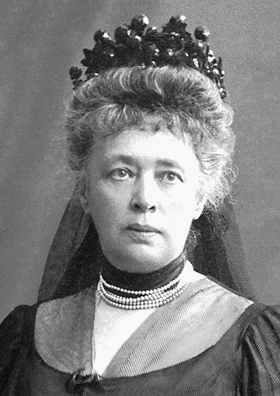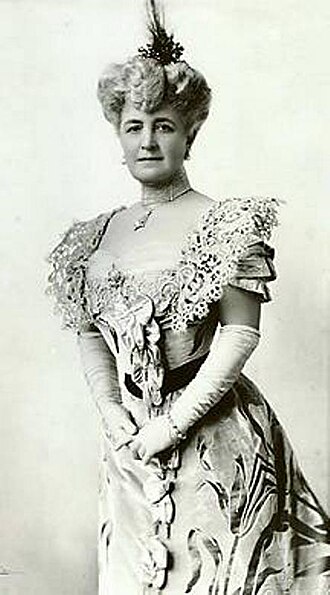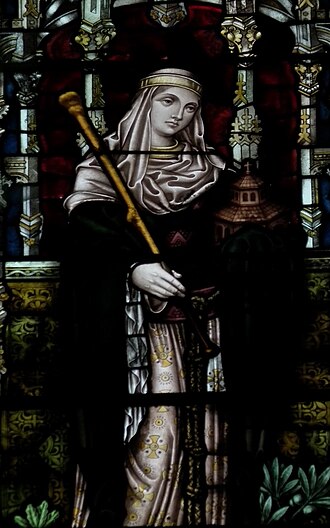Discover Your Roots
SIGN UPDiscover Your Roots
SIGN UPBertha is a female name of German origin, meaning "bright." It is derived from the Old High German word "berhta," which translates to "bright one." Historically, Bertha was often a shortened form of Anglo Saxon names such as Beorhtgifu, meaning "bright gift," or Beorhtwynn, meaning "bright joy." The name has also been associated with figures in Alpine folklore, particularly Berchta, linked to the Wild Hunt, and is believed to have originated from the epithet of *Frijjō. Bertha has a rich historical significance, with notable bearers including Saint Bertha of Kent, Queen of Kent, and Bertha Benz, the wife of automobile inventor Karl Benz. In addition, the name has been used for various fictional characters, including Bertha Mason in Charlotte Brontë's novel "Jane Eyre." The name Bertha holds a strong association with brightness and has been carried by influential individuals throughout history.

Baroness Bertha Sophie Felicitas von Suttner, also known as Bertha von Suttner, was an Austro-Bohemian noblewoman, pacifist, and renowned novelist. Born on June 9, 1843, in Prague, she made history by becoming the second female Nobel laureate and the first woman to receive the Nobel Peace Prize in 1905. Bertha overcame societal challenges, facing exclusion from the Austrian high nobility due to her "mixed" descent, and limited financial resources from her father. Despite these obstacles, she pursued an education in literature, philosophy, and languages, becoming proficient in French, Italian, and English. Bertha also cultivated her talents as an amateur pianist and singer. Her early engagements and encounters with prominent figures, such as Tsar Alexander II, shaped her aspirations, leading her to pursue a career as an opera singer. However, her stage fright and inability to secure professional engagements steered her towards a different path. Bertha von Suttner's dedication to peace advocacy and literary contributions have left an indelible mark on history, inspiring future generations with her remarkable achievements and unwavering commitment to promoting peace.

Bertha Alice Williams Graham Gifford, born on October 30, 1871, was a farmwife in rural Catawissa, Missouri, during the early 1900s. Accused of murdering three members of the local community and suspected in 15 additional deaths, she is considered by some as America's fifth solo female serial killer. Born in Morse Mill, Missouri, she was one of 10 children and married to Henry Graham, with whom she had one daughter, Lila. After Graham's death, she married Eugene Gifford, with whom she had one child, James.Gifford's notoriety stemmed from her cooking skills and care for sick neighbors and relatives, yet five people died in her care, leading to a grand jury investigation. In 1928, she was arrested and charged with three murders, and subsequent examinations revealed large amounts of arsenic in the bodies. Despite the three-day trial resulting in a verdict of not guilty by reason of insanity, she was committed to a psychiatric institution until her death in 1951. Gifford's role as a nurse to her sick neighbors saw a total of 17 people die in her care, with suspicions raised about an additional 12 deaths following a grand jury investigation. Given the high mortality rates and the amateur use of arsenic for medical reasons at the time, uncertainty remains about whether she purposefully killed everyone under her care.

Bertha Matilde Palmer (née Honoré; May 22, 1849 – May 5, 1918) was an influential American businesswoman, socialite, and philanthropist, best known for her significant contributions during the 1893 World's Columbian Exposition and her donation of an impressive impressionist art collection to the Art Institute of Chicago.Born in Louisville, Kentucky, in 1849, Bertha Matilde Honoré moved to Chicago at a young age. Recognized for her diverse talents and academic achievements, she was an accomplished musician, linguist, writer, politician, and administrator. In 1870, she married the prominent Chicago millionaire Potter Palmer, and despite challenges such as the devastating Chicago Fire, they successfully rebuilt their fortune and rose to the top of Chicago society.Palmer played a crucial role in various women's organizations, advocating for social welfare, women's education, and labor rights. As the President of the Board of Lady Managers, she was instrumental in shaping the Women's Building at the 1893 World's Fair, where women's achievements and progress were showcased.Her dedication to philanthropy, women's rights, and social causes left a lasting impact on Chicago's society and culture. Bertha Palmer's legacy continues to inspire and her contributions are celebrated at the Art Institute of Chicago.

Bertha, also known as Aldeberge, was a Frankish princess who became the queen of Kent during the 6th century. She played a significant role in enabling the 597 Gregorian mission led by Augustine, which resulted in the conversion of Anglo-Saxon England to Christianity. Bertha's marriage to the pagan Æthelberht of Kent in 580 was conditional upon her freedom to practice her Christian faith. She brought her chaplain, Liudhard, with her to England and restored a former Roman church just outside Canterbury, which was dedicated to Martin of Tours. This church, known as St Martin's Church, is recognized by UNESCO as the oldest continuously used Christian worship site in the English-speaking world. Bertha's influence and Æthelberht's goodwill were crucial in the establishment of monastic settlements and the cathedral in Canterbury. She is acknowledged for her faith and knowledge of letters, and she is believed to have had two children, Eadbald of Kent and Æthelburg of Kent. The legacy of Queen Bertha is celebrated in the City of Canterbury through the Bertha trail and bronze statues commemorating her and Æthelberht. Her exact date of death is disputed, but her impact on the spread of Christianity in England is undeniable.

Bertha Marian Holt (February 5, 1904 – 2000) was an influential figure in the field of international adoptions. Born in Des Moines, Iowa, she founded the Holt International Children's Services and played a pivotal role in changing the law in America to allow for more than two international adoptions. After obtaining her nursing degree, Bertha married Harry Holt and the couple faced many challenges, including having to leave their farm during the Great Depression. In 1954, the Holts were deeply moved by a film about children in Amerasian South Korean orphanages, leading them to adopt eight children from South Korea, which ultimately prompted changes in federal adoption laws. The couple went on to found the Holt International Children's Services in 1956, pioneering the system for international adoptions.Bertha Holt's dedication to improving the lives of orphaned children extended beyond her family's adoptions. Following her husband's passing, she continued to work tirelessly, lobbying for better adoption programs in other countries and improving conditions at the IlSan Center in Korea. Bertha Holt's legacy lives on through her extensive family, the Holt International Children's Services, and her induction into the National Women's Hall of Fame in 2002. Bertha Holt passed away at the age of 96 in 2000 at her home in Creswell, Oregon. She also authored several books, including "The Seed From The East" and "Bring My Sons From Afar: The unfolding of
All images displayed on this page are sourced from Wikipedia or Wikimedia Commons.We use these images under their respective Creative Commons or public domain licenses. Wherever applicable, author attributions and license information are provided. If you believe an image is used incorrectly or outside its license terms, please contact us so that we can review and correct the issue.